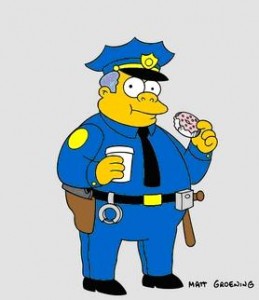Common Mistakes by Police in Harris & Galveston Counties
Investigative Failures
One of the toughest things for people to grasp when they are facing a DWI charge they do not believe they are guilty of committing is to understand that innocent people sometimes get arrested and must defend themselves against the government’s DWI machine. This typically happens because the officer either jumps to conclusions, or views the evidence he sees through biased vision.
Improper DWI Investigation
The fact of the matter is that DWI investigations are complex. It requires an officer to evaluate you and your behavior through three phases of the DWI Detection Process.
A typical DWI investigation begins when the officer sees your vehicle commit a traffic offense or exhibit a sign that the driver might be intoxicated. This can be something as simple as failing to stop at a stop light, or as serious as steering into oncoming traffic.
Phase 1: Vehicle in Motion

After the officer has decided to stop you he is trained to look at how you stop your vehicle.
Some of the things he looks for are:
- Did you stop suddenly in the traffic lane?
- Did you use your turn signal to indicate you were pulling over?
- Did you stop in an appropriate area – such as a parking lot or shoulder of the road?
- How long did it take you to acknowledge the police officer’s presence and that he was attempting to stop your vehicle?
- Did you suddenly weave or swerve when he turned on his overhead lights?
- Did you attempt to flee
While no one of these factors is conclusive evidence of drunk driving, when looking at them in totality, the officer is taught to make judgments as to whether you may be intoxicated.
Phase 2: Personal Contact
The second phase of a DWI arrest is the Personal Contact phase. This is when the officer approaches your vehicle and talks with you.
Some of the things the officer is looking for are:
- Does your vehicle have the odor of alcoholic beverages when you roll down your windows?
- Is your speech slurred?
- Do you or your clothing appear sloppy?
- Can you understand the officer’s questions and give appropriate responses?
- Are you able to retrieve your driver’s license and other paperwork and hand it to the officer without problems?
- Are you combative or insulting?
Again, no one thing is supposed to give the officer justification to continue with a DWI investigation. In reality, however, if you exhibit any of these signs you will likely be asked to step out of your vehicle and perform the Standardized Field Sobriety Tests.
Phase 3: Pre-arrest screening
If the officer suspects you have been drinking he will likely ask you to perform the field sobriety tests. You are not legally required to do so. During this phase of the DWI Detection Process the officer is testing whether your physical and mental faculties are impaired. For more on the field sobriety tests read this.
Totality of the Circumstances
One of the most important things police are trained to review in making DWI arrests is to view the entire DWI Detection Process as a whole. They are not supposed to look at one phase, or one factor in making their arrest / no arrest decision. Instead, they are trained to view the evidence through the lens of the “Totality of the Circumstances.” This simply means that they look at factors from each phase of the DWI detection process and make a determination of whether they have probable cause to arrest you.
If the officer fails to properly evaluate you and your conduct through all three phases of the DWI Detection Process he will likely make an incorrect arrest/no arrest decision.
Improper Warnings
Texas police are required to read certain warnings to you during a DWI arrest. They are not allowed to question you after you have been arrested without first reading you the Miranda Warning. They are also required to read you the Implied Consent warning before asking you to submit to a sample of your breath, blood, or urine.
If the officer fails to properly warn you as required by the law, then any evidence he gains may be barred from being used against you.
Warrant Errors
More and more police are seeking warrants for your blood if you refuse to provide a breath sample in a DWI case. The warrant requests are subject to certain requirements that the officer must follow. He first and foremost must be honest in his application. If the officer misstates material facts in the warrant application then any evidence gathered from that warrant may be excluded from the trial.
Secondly, the officer must serve the warrant within the time frame the judge or magistrate includes when issuing the warrant. All warrants are required to be served within a set time frame. If the warrant is not served in the appropriate time frame any evidence gathered may be excluded from trial.
Improper Evidence Handling
Blood or urine evidence is subject to strict chain of custody requirements, and must be properly gathered, stored and transported in order to be admitted into court.

There have been cases from around the nation where an officer has gathered a blood sample and then left that sample in the trunk of his patrol car for days or weeks before turning it over to the lab.
This can cause the BAC level of the sample to rise, and would result in an artificially high BAC reading when the blood is tested at the lab.
In order to make sure that the courts have confidence that blood or urine samples are not tampered with after they have been collected there are strict procedures for ensuring their security. Typically the evidence is placed in a sealed container of some sort and evidence tape is placed around the container is such a way as to indicate if the container has been opened.
Evidence tape is not the same as they types of tape you may use at home or in an officer. It is a thin tape that will tear in irregular patterns or change colors after it has been broken. Officers typically write their initials over the tape at various spots, to ensure that the tape on the container is intact when it arrives at the lab are the same tape they put on the container when they collected the evidence.
Improper Evidence Logs
Everyone who takes custody of a piece of evidence should be recorded in a log of some sort so that the court has confidence that they know every place that evidence has been and who has touched it from the time the evidence was collected until the time the evidence appears in court. There should be no gaps in time of who has handled the evidence.
Improper Breath Machine Maintenance
The State of Texas has procedures on how DWI breath machines must be maintained and tested before evidence gathered from these machines should be admitted in court.
Texas DWI breath machines are fickle pieces of equipment. They require regular maintenance and testing to make sure they provide accurate results when your breath is tested. There are a number external factors that can affect the reliability of breath machine results including, temperature of the room where the machine is used, electrical supply that powers the machine must be within given criteria, the area must be relatively free of dust and other air contaminants, and regular solution sampling must be performed to make sure the machine operates within tolerances.
Improper or Illegal Stops or Search & Seizure
If the police stop or search you or your car illegally or improperly any evidence gained against you in that stop or search may be excluded from trial. There are a number of ways this can happen, and a number of exceptions the courts may make to allow the evidence to be used against you.
These types of defenses are heavily dependent on multiple facts that have to be viewed with a careful eye as to both statute and constitutional considerations. Nonetheless, the mistakes do occur and can result in your case being dismissed.
If you need to speak with an experienced defense attorney about DWI-related charge you may be dealing with, call The Law Offices of Tad Nelson & Associates today. The phone number to our office is 713-802-1631. We have offices in Houston, Clear Lake, Galveston, and League City.







